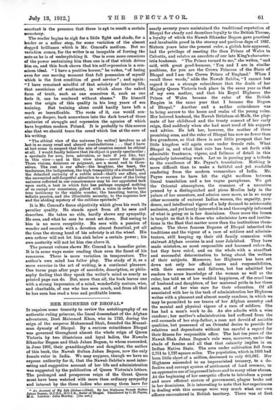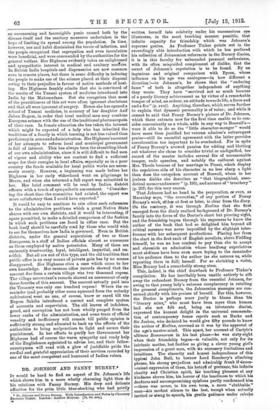HER HIGHNESS OF BHOPAL.* IT requires some temerity to review
the autobiography of an authentic ruling princess, the lineal descendant of the Afghan adventurer, Dost Mabomed Khan, who in 1723, during the reign of the emperor Muhammad Shah, founded the Mussal- man dynasty of Bhopal. By a curious coincidence Bhopal was governed throughout almost the whole reign of Queen Victoria by two illustrious and loyal ladies, the Nawabs Sikandar Begam and Shah Jahan Begam, to whom succeeded, in June 1901, their granddaughter and daughter, the author of this book, the Nawab Sultan Jahan Begam, now the only female ruler in India. We may suppose, though we have no express authority for it, that the Nawab Sahiba's most inter- esting and suggestive account of her life and administration was suggested by the publication of Queen Victoria's letters. The prolonged and prosperous reign of the Great Queen must have been watched with more than ordinary sympathy and interest by the three ladies who among them have for
• An Account of My Life (Gokur-i-lkbal). By her Highness Nawab Sultan Jahan Begam, G.C.S.I.. G.C.I.E., Ruler of Bhopal. Translated by C. H. Payne, M.A. London : John Murray. [158. net.]
nearly seventy years maintained the traditional reputation of Bhopal for steady and dauntless loyalty to the British Throne, a loyalty of which the Nawab Sikandar Begam gave practical and invaluable proof in the stormy and perilous days of 1857. Sixteen years later the present ruler, a girlish heir-apparent, had the privilege of meeting the then Prince of Wales in Calcutta, and relates an anecdote of our late King's character- istic bonhomie. " The Prince turned to me," she writes, " and said, with great good-humour, You and I are in similar positions, for you are the Crown Princess of the State of Bhopal and I am the Crown Prince of England.' When I recall these words," adds the Nawab Sahiba, "I cannot but regard it as a strange coincidence that the death of her Majesty Queen Victoria took place in the same year as that of my own mother, and that his Royal Highness the Prince of Wales became the ruler of the British Empire in the same year that I became the Begam of Bhopal." Another and a sadder coincidence was to bring sorrow to the home and realm of the young ruler. Her beloved husband, the Nawab Ihtisham-ul-Mulk, the play- mate of her childhood and the trusty consort of her early reign, died suddenly when she had most need of his support and advice. He left her, however, the mother of three promising sons, and the ruler of Bhopal has now no fewer than five grandsons, so that there is now little prospect that her little kingdom will again come under female rule. What Bhopal is, and what that rule has been, is set forth with admirable frankness, vigour, and fullness of detail in this singularly interesting work. Let us in passing pay a tribute to the excellence of Mr. Payne's translation. Nothing is more difficult than to make a faithful and yet readable rendering from the modern vernaculars of India. Mr. Payne seems to have hit the right medium between literal translation and a too vague paraphrase. We get the Oriental atmosphere, the romance of a narrative penned by a distinguished and pious Muslim lady in the palace of her ancestors, and admire once more, as in so many other accounts of eminent Indian women, the sagacity, pru- dence, and intellectual vigour of a lady doomed to aristocratic seclusion, and yet keenly interested in and thoroughly informed of what is going on in her dominions. Once more the lesson is taught us that it is those who administer laws and institu- tions in the East that matter more than the institutions them- selves. The three famous Begams of Bhopal inherited the traditions and the vigour of a race of soldiers and adminis- trators, still keeping up their old family connexion with stalwart .Afghan cousins in and near Jalalabad. They have made mistakes, as most responsible and harassed rulers do, but they have ruled, and on the whole with a steadfast and successful determination to bring about the welfare of their subjects. Moreover, her Highness has here set down not only her official cares and responsibilities, with their successes and failures, but has admitted her readers to some knowledge of the woman as well as the ruler, has told us of her wedded happiness, of the cruel loss of husband and daughters, of her maternal pride in her three sons, and of her wise care for their education. Of all associated with her in the task of administration her Highness writes with a pleasant and almost manly candour, in which we may be permitted to see traces of her Afghan ancestry and the mental and physical vigour of a race of soldiers. She has had a man's work to do. As she admits with a wise candour; her mother's administration had suffered from the evil counsels of her step-father, a man not devoid of amiable qualities, but possessed of an Oriental desire to provide for relatives and dependents without too careful a regard for their fitness for responsible office. The last ten years of the Nawab Shah Jahan Begam's rule were, moreover, under the shade of famine and all that that calamity implies in an Indian Native State. The area under cultivation fell from 2,751 to 1,737 square miles. The population, which in 1891 had been little short of a million, decreased to only 665,961. Her Highness succeeded to an impoverished treasury, to a de- fective and corrupt system of settlement of land revenue, to an oppressive use of impressed lahour,and to many other abuses. At the beginning of her energetic efforts to introduce a purer and more efficient system of government, plague broke out in her dominions. It is interesting to note that her experiences in dealing with this scourge were very much what our own officers encountered in British territory. There was at first
an unreasoning and incorrigible panic caused both by the disease itself and the sanitary measures undertaken in the hope of limiting its spread among the population. In time, however, use and habit diminished the terror of infection, and the people recognized that segregation and even inoculation were beneficial, and were commanded by the authorities for the general welfare. Her Highness evidently takes an enlightened and sympathetic interest in medical and sanitary matteis.
• In British India hospitals and dispensaries are now common even in remote places, but there is some difficulty in inducing the people to make use of the science placed at their disposal owing to their prejudice in favour of native methods of heal- ing. Her Highness frankly admits that she is convinced of the merits of the Yunani system of medicine introduced into India by the Mahomedans. But she recognizes that most of the practitioners of this art were often ignorant charlatans and that all were ignorant of surgery. Hence she has opened a school of Yunani medicine, in memory of her daughter Asif Jahan Begam, in order that local medical men may combine European science with the use of the traditional pharmacopoeia of their race. In female education she has taken the interest which might be expected of a lady who has inherited the traditions of a family in which learning is not less valued than proficiency in arms and administration. Her Highness's account of her attempts to reform local and municipal government is full of interest. This has always been the stumbling-blook of our own administration, since it is still difficult to find men of vigour and ability who are content to find a sufficient scope for their energies in local affairs, especially as in a poor country the funds available for local public works are neces- sarily scanty. However, a beginning was made before her Highness in her early Widowhood went on pilgrimage to Mecca, and when she returned a full report was submitted to her. lEker brief comment will be read by Indian district officers with a touch of sympathetic amusement. "rConsider- ing the short time the committee had existed, the report was more satisfactory than I could have expected."
It would be easy to continue to cite other such references to the administrative problems which a great Native State shares, with our own districts, and ,it would be interesting, if space permitted, to make a detailed comparison of the fashion in which such problems ape faced in either case. Brit the book itself should be carefully read by those who would wish to see for themselves how India is governed. Even in British districts, under the general supervision of two or three Europeans, is a staff of Indian officials almost as nnmerous as those employed by native potentates. Many of them are eminently trustworthy, loyal, intelligent, impartial, and un- selfish. But all are not of this type, and the old tradition that public office is an easy means of private gain has by no means disappeared. Her Highness cites a case which came to her own knowledge. Her revenue office records showed that the amount due from a certain village was two thousand rupees: The village accountant's records showed an assessment of only three-fourths of this amount. The amount actually paid into the Treasury was only one hundred rupeesa Where the re- mainder (and probably other sums squeezed from the unlucky cultivators) went no one, of course, knew or cared till the Begam Sahibs introduced a correct and complete system of accounts and supervision. The old leaven of indolence, greed, and corruption has not been wholly purged from the lower ranks of the administration, and some trace of official venality and inefficiency will remain till public opinion is sufficiently strong and educated to back up the efforts of the authorities to bring malpractices to light and secure their punishment, In her efforts to purify her Government her Highness had of course the warm sympathy and ready help of the Englishmen appointed to advise her, and their fellow- countrymen will read with a glow of justifiable pride the cordial and grateful appreciation of their services recorded by one of the most competent and honoured of Indian rulers.







































 Previous page
Previous page